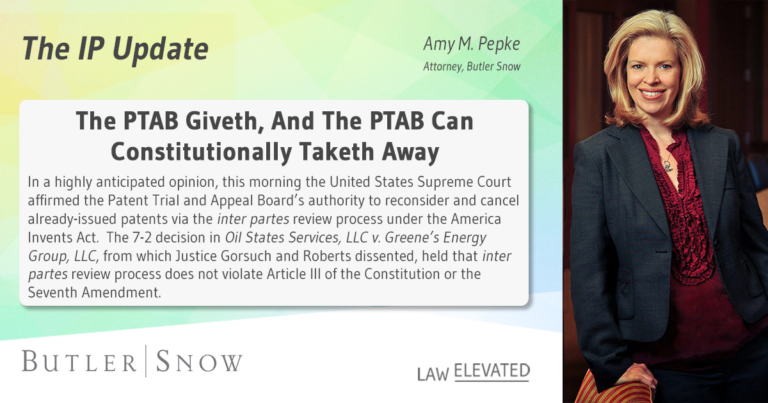In a highly anticipated opinion, this morning the United States Supreme Court affirmed the Patent Trial and Appeal Board’s authority to reconsider and cancel already-issued patents via the inter partes review process under the America Invents Act. The 7-2 decision in Oil States Services, LLC v. Greene’s Energy Group, LLC, from which Justice Gorsuch and Roberts dissented, held that inter partes review process does not violate Article III of the Constitution or the Seventh Amendment.
Petitioner Oil States Energy Services, LLC challenged the constitutionality of the PTAB’s inter partes review process, under which Greene’s Energy Group, LLC obtained a decision invalidating a patent previously issued to Oil States. Oil States argued that proceedings to invalidate a patent must be tried before an Article III court before a jury. Specifically, it argued that once a patent had been issued, the patent rights became “private property of the patentee.”
The Court rejected Oil State’s argument, resting its opinion on the distinction between “public rights” and “private rights” – a distinction the Court admitted has not been “definitively explained” in prior opinions. Congress has authority to assign adjudication of public rights to entities other than Article III courts. The Court explained that the public rights doctrine applies to matters “arising between the government and others” and that the inter partes review involves just such a matter : review of the Government’s decision to grant a public franchise through issuance of a patent. Characterizing the process as a “second look at an earlier administrative grant of a patent,” the Court reaffirmed prior opinions that public franchises can be qualified by the possibility of later cancelation. Consequently, the PTO has the authority to grant patents subject to the qualification that they may be reexamined, and even canceled, during a later review. Furthermore, because Congress properly assigned these matters to adjudication in a non-Article III tribunal, the Court rejected Oil State’s argument that the process violated the Seventh Amendment, which protects the right of trial by jury.
The Court carefully narrowed its opinion to the constitutional arguments expressly raised by the parties, cautioning that the decision should not be interpreted as suggesting that patents are not property for purposes of the Takings Clause or Due Process Clause.
The decision brings stability to an issue that had the potential to destabilize the patent landscape. For the last year, pending the Court’s decision in this case, practitioners struggled with the decision of whether to invest significant resources in an inter partes review proceeding that could have been rendered useless had the Court reached a different conclusion. Delay tactics proliferated in litigation while parties attempted to wait out the Court’s deliberations. The Court’s opinion in Oil States has laid to rest those concerns affirming the PTAB’s constitutional authority to take a “second look” at previously issued patents.
